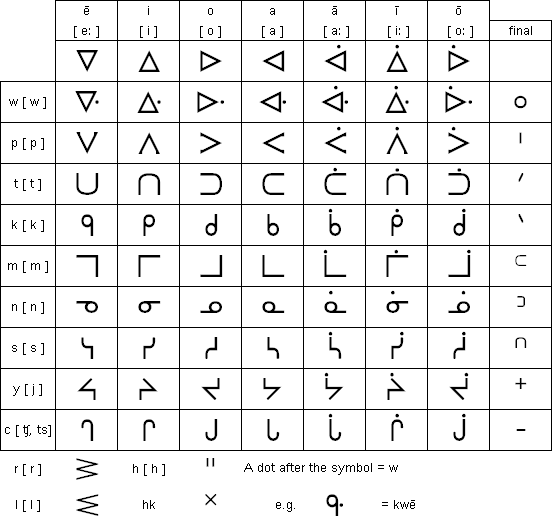“I yearn to learn”: poems in English and Cree
Posted: July 1, 2015 Filed under: Cree, English, Naomi McIlwraith | Tags: Poems about the Cree language, Poems for Canada Day 2015 Comments Off on “I yearn to learn”: poems in English and Cree
The old Plains Cree syllabary, now not often used. Romanization i.e. the use of English alphabet letters has taken its place.
Naomi McIlwraith
nôhtâwiy opîkiskwêwin – Father Tongue
.
I read about the –ikawi suffix
and the unspecified actor form,
wonder about the curiosities
of active or passive voice in Cree,
but mostly I yearn to learn
real Cree words, am eager to hear
nêhiyawêwin itwêwina in the air.
Want to hear your voice.
.
Food words like bread and tea
and water –
pahkwêsikan, maskihkîwâpoy,
êkwa nipiy.
.
Words for tree and bud and leaf –
mistik, osimisk, êkwa nîpiy.
.
Seasonal words for winter, spring,
summer, and fall –
pipon, miyoskamin,
nîpin, êkwa takwâkin.
.
Weather words like snow and rain,
sunshine and wind –
mispon êkwa kimiwan,
wâsêskwan êkwa yôtin.
.
More food words like cookie,
tomato, and cheese –
wîhki-pahkwêsikanis,
kihci-okiniy, êkwa
âpakosîsi-mîciwin.
.
Nature words for lake, mountain,
prairie –
sâkahikan, asinîwaciy,
paskwâw.
How to say picnic and camping –
papâ-mîcisowin êkwa kapêsiwin.
How we always picked bottles
when we went picnicking or camping –
kâkikê ê-kî-môsâhkinamâhk
môtêyâpiskwa ispî
kâ-kî-papâ-mîcisoyâhk
ahpô ê-nitawi-kapêsiyâhk.
.
How the sky is blue just now,
when it’s been grey for so long.
sîpihkonâkwan mêkwâc kîsik
mâka kinwês ê-kî-pihkonâkwahk.
.
I want to hear words for car and canoe
and toboggan and cradleboard –
sêhkêpayîs êkwa cîmân
napakitâpânâsk êkwa tihkinâkan.
Baby, boy, girl, man, and woman –
oskawâsis, nâpêsis, iskwêsis, nâpêw, êkwa iskwêw.
.
Kinship terms like mother and father –
nikâwiy êkwa nôhtâwiy.
Grandmother and grandfather –
nôhkom êkwa nimosôm.
My little siblings, sister and brother –
nîcisânak, nimis êkwa nistês.
Auntie and uncle –
nikâwis êkwa nôhcâwîs.
.
If only I had stopped long enough
to say “my girl” or “my boy” –
“nitânis” êkwa “nikosis”.
.
Words for old woman and old man –
nôcokwêsîs êkwa kisêyinîs.
Words for hard and soft,
loud and quiet –
ê-maskawâk êkwa ê-yôskâk
ê-sôhkihtâkwahk êkwa
ê-kâmwâtahk.
.
Words for the ground is hard –
ê-maskawahcâk,
the silence is loud –
ê-sôhkihtâkwahk kipihtowêwin,
your voice soft and quiet –
ê-miyotâmoyan êkwa ê-kâmwâtahk.
.
You always spoke so softly
like a steady rain on parched land.
kâkikê ê-ki-manâcimiyâhk
tâpiskôc kimiwan,
ê-pahkipêstâk
itê ê-pâhkwahcâk.
.
Maybe that’s why you sound
so far away now –
kiyâwihtâkosin êkwa anohc.
Verbs for listening and persevering –
ê-nitohtawiyan êkwa ê-âhkamêyihtamohiyan,
and loving and raising children –
ê-kî-sâkihiyâhk êkwa
kiya êkwa nikâwînân
ê-kî-nihtâwôsêyêk.
Words for birth and death and funeral –
ê-kî-miyo-pimâtisiyan, mâka
ispîhk ê-kî-kisipipayiyan
êkwa kikî-âstêsinin kitaywêpiwinihk.
.
Verbs for kind and just
and humble and soft-spoken –
ê-kî-kisêwâtisiyan
êkwa ê-kî-kwayaskwâtisiyan,
ê-kî-tapahtêyimisoyan
êkwa ê-kî-pêyâhtakowêyan.
.
The verb for soft-hearted –
ê-kî-yôskâtisiyan,
and how you had a soft spot
in your heart for all
Cree people –
ê-kî-yôskitêhêstawacik
kahkiyaw nêhiyawak.
.
Verbs for generous and caring –
ê-kî-sawêyimacik êkwa ê-kî-nâkatêyimacik.
Words for thoughtful and oh,
such good Cree speech –
ê-kî-kâh-kakihcihiwêyan,
ê-kî-miyo-tôtaman
tahtwâw ê-kî-nêhiyawêyan.
.
Words for being so good
at so many things –
ê-kî-nahîyan mistahi kîkway.
.
Words for sadness and regret –
nipîkiskâtisin êkwa kikîsinâtêyihtamâtin.
Because sickness stole your speech
and I came too late to listen –
osâm kitâhkosiwin
kipîkiskwêwin ê-kimotamâkoyan
êkwa ê-kî-mwêstasisiniyân
ka-nitohtâtân.
.
Yet now you’re whispering
and I’m listening –
mâka êkwa anohc âta ê-kîmwêyan
kina-nahihtâtin.
. . .
Like Bead on a String
.
Like an umbilical cord, the rainbow
connects sky to earth:
mother and child hold each other close.
.
tâpiskôc otisiyêyâpiy pîsimwêyâpiy
ê-itâpêkamohtât askîhk kîsikohk ohci
ê-âkwaskitinitocik awâsis êkwa okâwîmâw.
.
Like a rawhide rope, the vocal cords
secure the gift of story and song:
grandfather and grandchild hold each other close.
.
tâpiskôc pîsâkanâpiy pîkiskwêyâpîsa
ê-tipahpitahk miyikowisiwin âcimowin êkwa nikamowin
ê-âkwaskitinitocik mosôm êkwa ôsisima
.
Like a bead on a string, my great-grandmother
sits next to her kin just long enough
for me to reach for her hands.
.
tâpiskôc kâ-tâpisahoht mîkis, nitâniskotâpân
apîstawêw owâhkômâkana nahiyikohk
kici-têpinamwak ocihciya.
. . .
ihkatawâw ay-itwêhiwêw – The Marsh Sends a Message
.
Reeds breathe and I sense
that in this wet world
the breath utters a language
not yet lost, whispers words
not yet forgotten
cries a marsh message
that must be heard. âniskowaskwa
speak to me of kinosêw,
sâkahikan, manitow-sâkahikan,
êkwa nipiy. Reeds
confident and eloquent
ê-sôhkêyimocik êkwa ê-nihtâwêcik
tell me a story
ê-âcimostawicik
âniskowaskwa, fluid and flowing
a fluent kind of knowing,
whispering a story about this great land.
.
ê-kîmwêcik, ê-âtotahkik ôma kihci-askiy.
. . .
Naomi McIlwraith is an educator, poet, and essayist, with a mixed Cree, Ojibwe, Scottish, and English inheritance. Most recently at Grant MacEwan University in Edmonton, she has also held instructional positions at the University of Alberta and the King’s University College.
.
The poet here explores linguistic identity – loss and discovery, family history, belonging – as she experiments with two languages: Plains Cree (nêhiyawêwin) and English (âkayâsîmowin – “English” in Cree).
.
The poems above were selected from Kiyâm: Poems by Naomi McIlwraith,© 2012, and published by AU Press, Athabasca University, Edmonton, Alberta, Canada.
. . . . .